Abstract
Relations between working conditions and mental health status of female hospital workers were studied in a sample of 1505 women: 43% were nurses, 32% auxiliaries, and 7% ancillary staff; 13% were other qualified health care staff, mainly head nurses; 5% had occupations other than direct health care; 63% worked on the morning, 20% on the afternoon, and 17% on the night shift. Data were collected at the annual routine medical visit by the occupational health practitioner, using self administered questionnaires and clinical assessments. Five health indicators were considered: a high score to the general health questionnaire (GHQ); fatigue; sleep impairment; use of antidepressants, sleeping pills, or sedatives; and diagnosis of psychiatric morbidity at clinical assessment. Four indices of stress at work were defined: job stress, mental load, insufficiency in internal training and discussion, and strain caused by schedule. The analysis was conducted by multiple logistic regression, controlling for type of occupation, shift, number of years of work in hospital, daily travel time to work, age, marital status, number of children, and wish to move house. Sleep impairment was mostly linked to shift and strain due to schedule. For all other indicators of mental health impairment and especially high GHQ scores, the adjusted odds ratios increased significantly with the levels of job stress, mental load, and strain due to schedule. This evidence of association between work involving an excessive cumulation of stress factors and mental wellbeing should be considered in interventions aimed at improving the working conditions of hospital workers.
Full text
PDF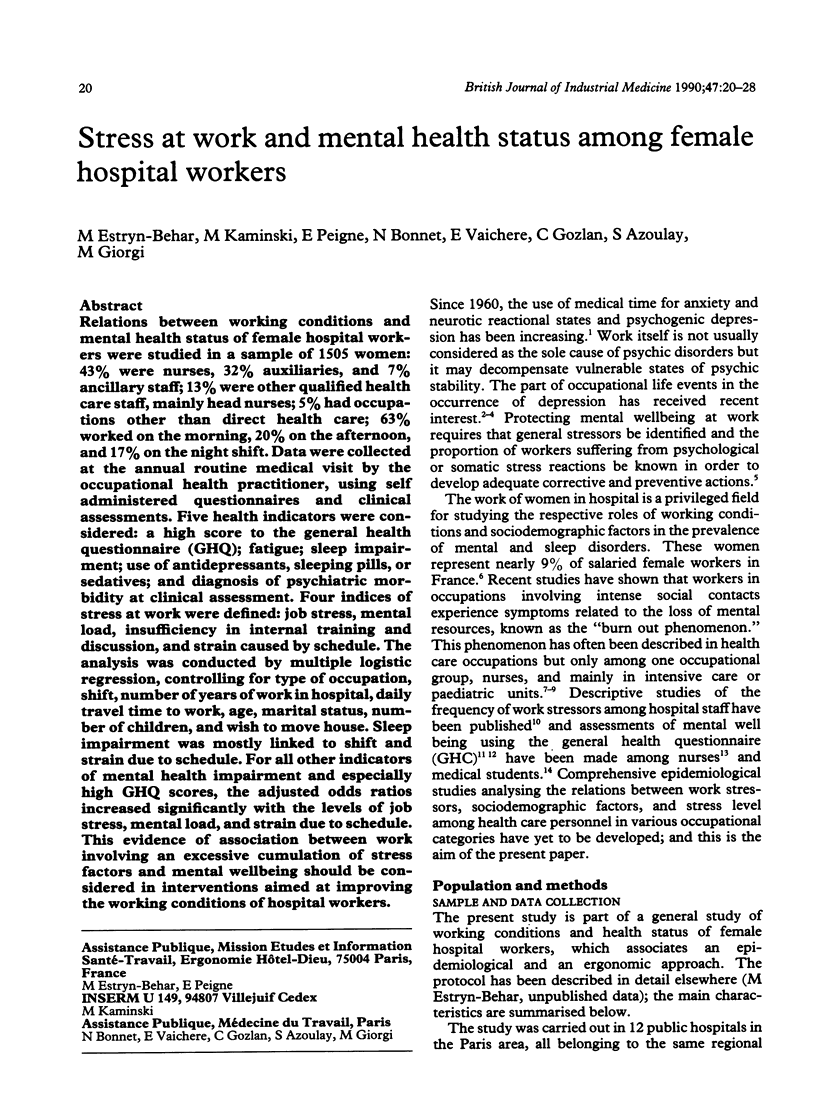

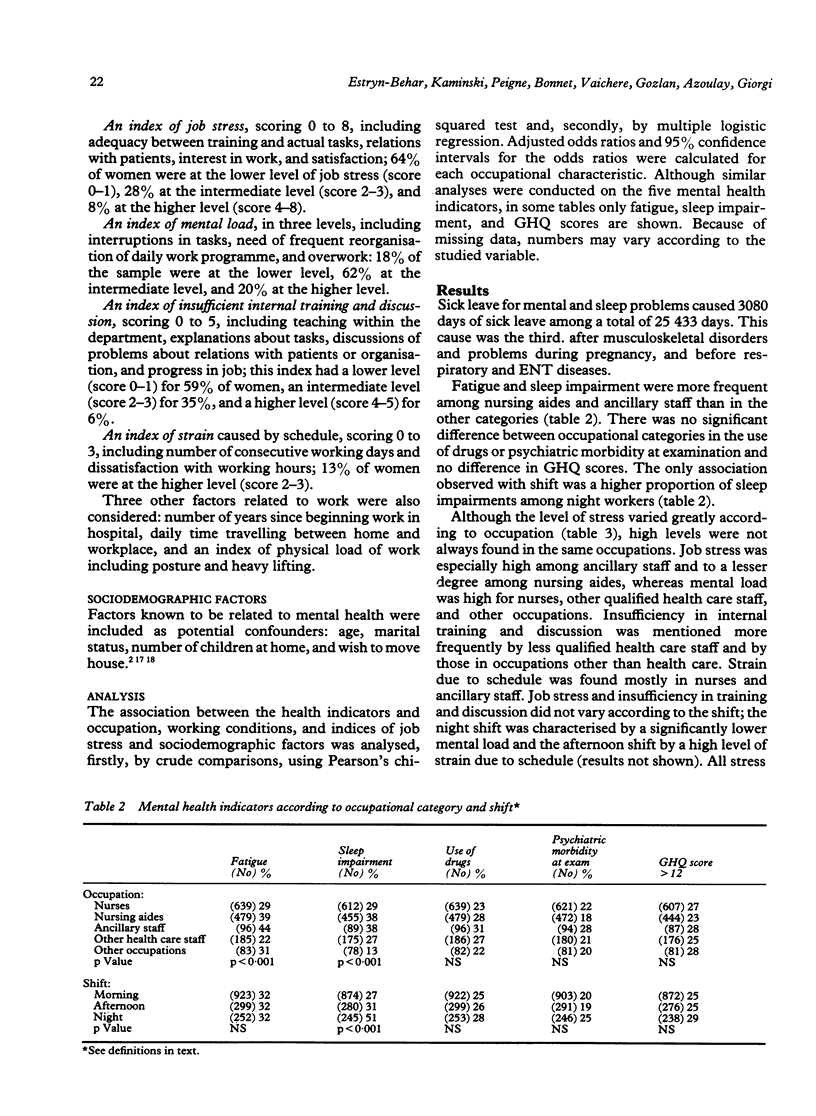

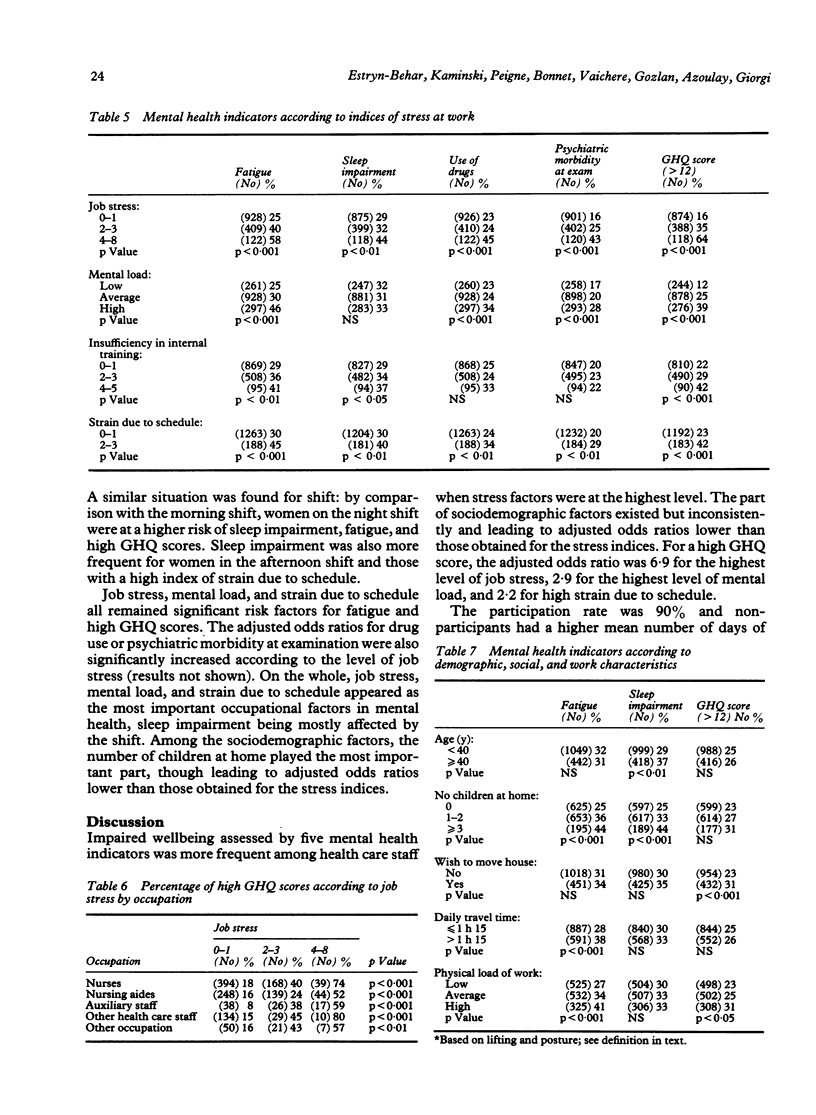
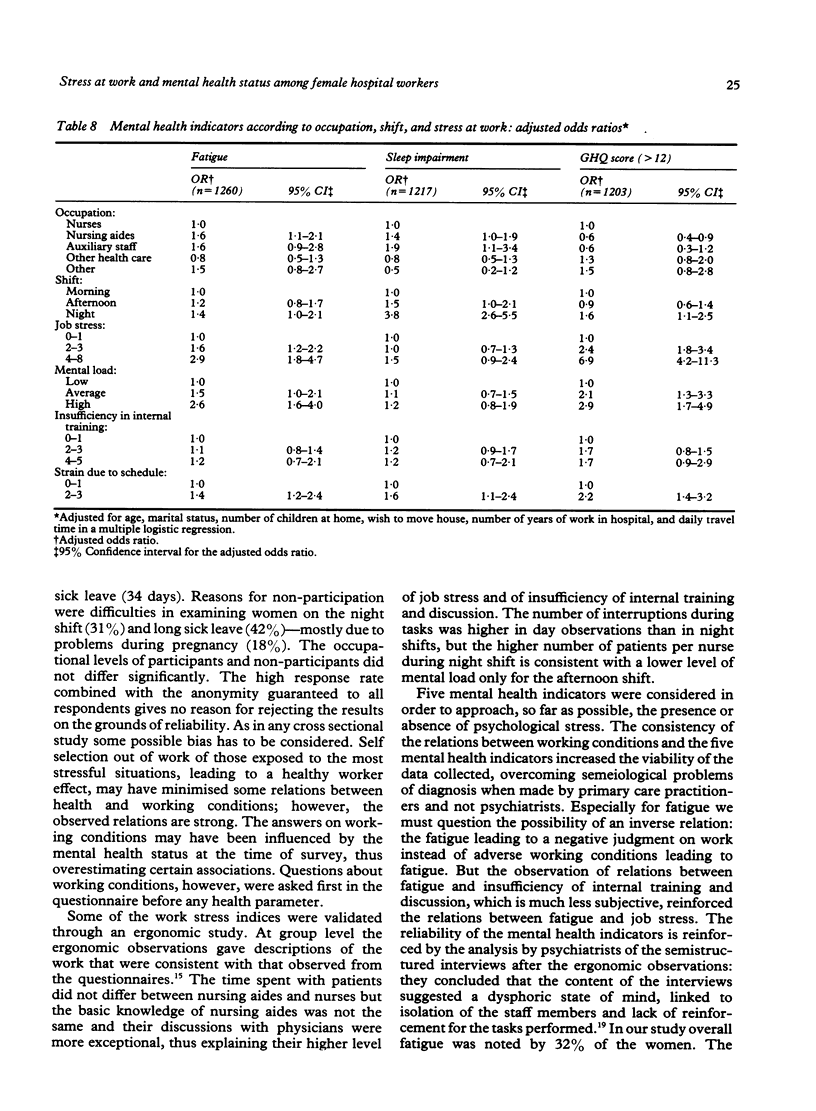
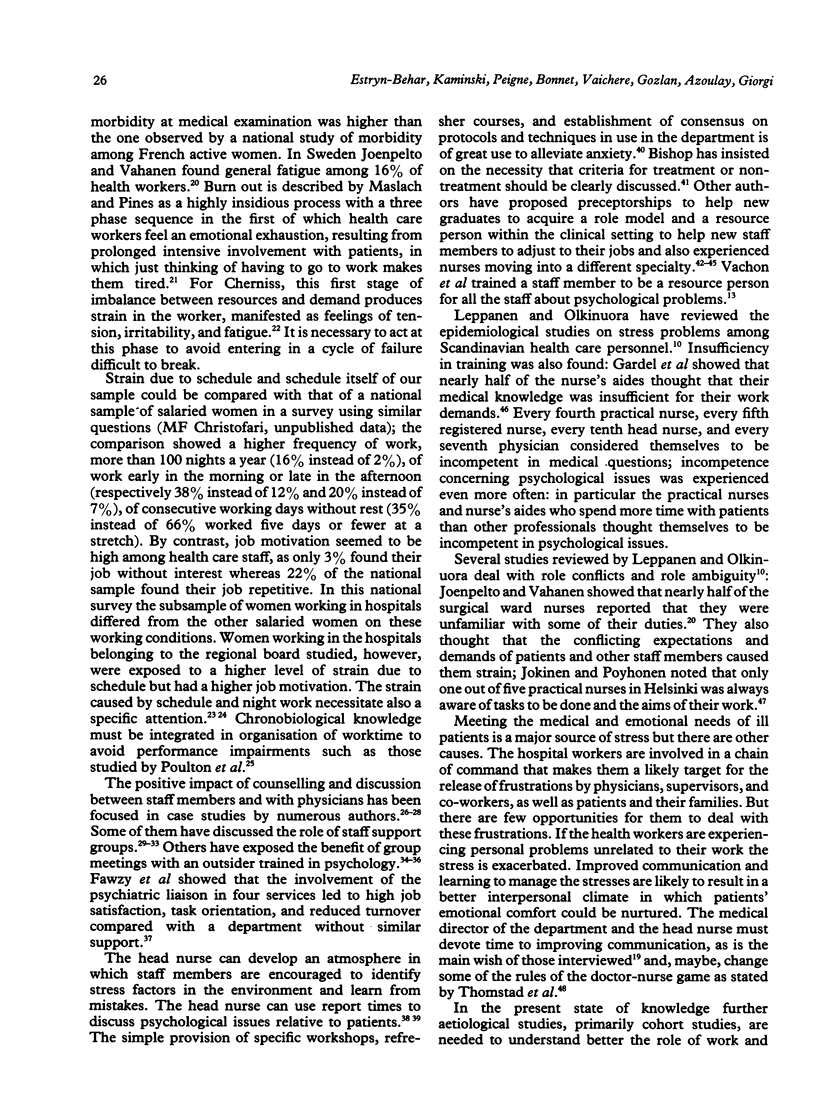
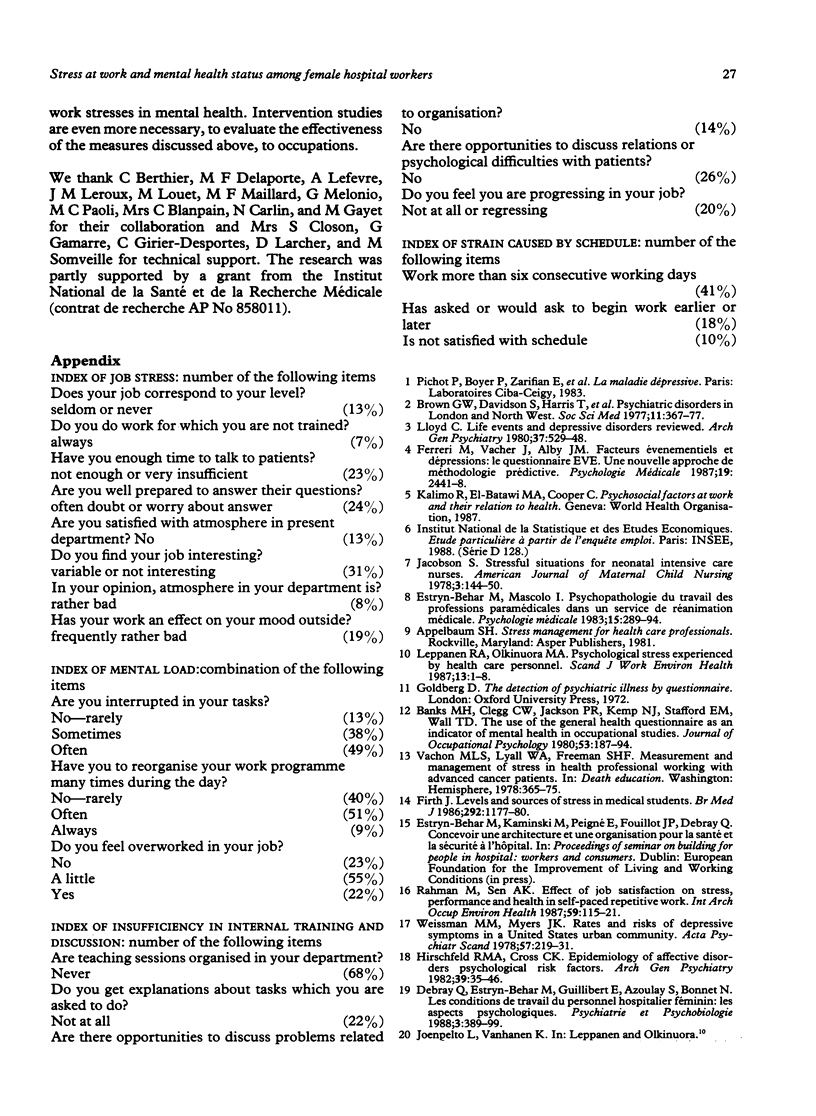
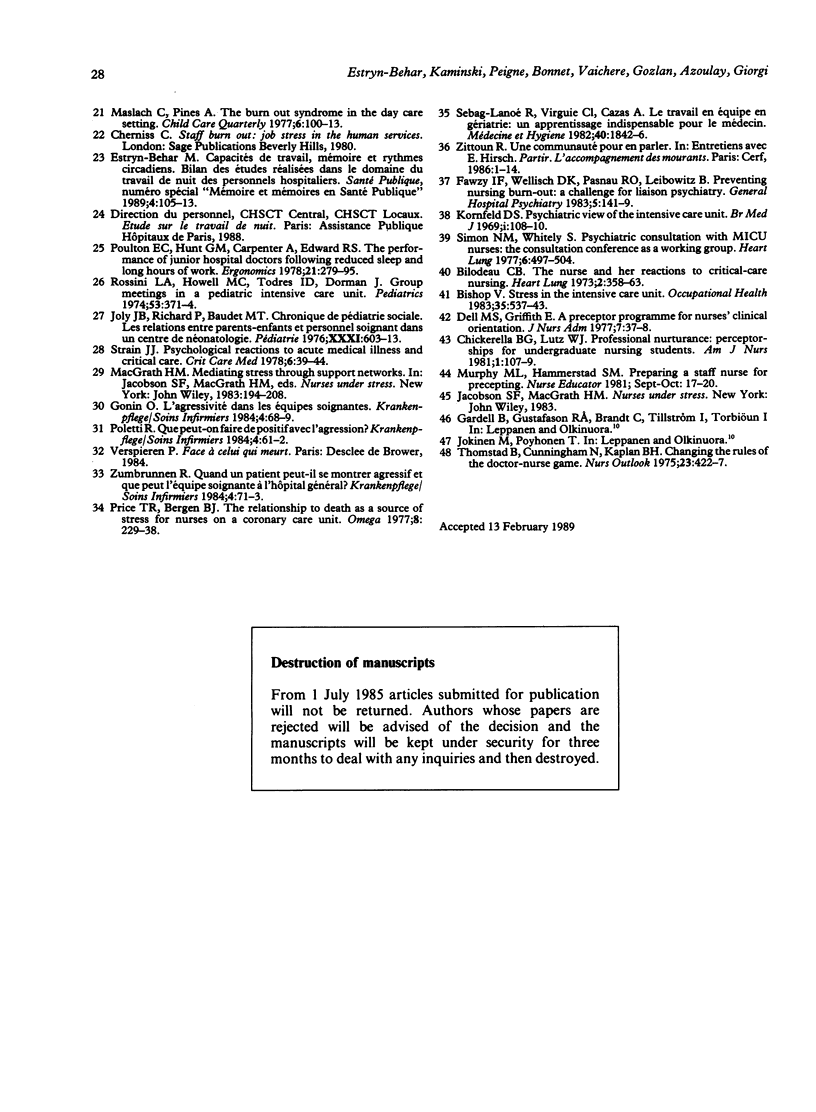
Selected References
These references are in PubMed. This may not be the complete list of references from this article.
- Bilodeau C. B. The nurse and her reactions to critical-care nursing. Heart Lung. 1973 May-Jun;2(3):358–363. [PubMed] [Google Scholar]
- Bishop V. Stress in the intensive care unit. Occup Health (Lond) 1983 Dec;35(12):537–543. [PubMed] [Google Scholar]
- Brown G. W., Davidson S., Harris T., Maclean U., Pollock S., Prudo R. Psychiatric disorder in London and North Uist. Soc Sci Med. 1977 Apr;11(6-7):367–377. doi: 10.1016/0037-7856(77)90100-7. [DOI] [PubMed] [Google Scholar]
- Chickerella B. G., Lutz W. J. Professional nurturance: preceptorships for undergraduate nursing students. Am J Nurs. 1981 Jan;81(1):107–109. [PubMed] [Google Scholar]
- Dell M. S., Griffith E. A preceptor program for nurses' clinical orientation. J Nurs Adm. 1977 Jan;7(1):37–38. doi: 10.1097/00005110-197701000-00012. [DOI] [PubMed] [Google Scholar]
- Fawzy F. I., Wellisch D. K., Pasnau R. O., Leibowitz B. Preventing nursing burnout: a challenge for liaison psychiatry. Gen Hosp Psychiatry. 1983 Jul;5(2):141–149. doi: 10.1016/0163-8343(83)90114-7. [DOI] [PubMed] [Google Scholar]
- Firth J. Levels and sources of stress in medical students. Br Med J (Clin Res Ed) 1986 May 3;292(6529):1177–1180. doi: 10.1136/bmj.292.6529.1177. [DOI] [PMC free article] [PubMed] [Google Scholar]
- Hirschfeld R. M., Cross C. K. Epidemiology of affective disorders. Arch Gen Psychiatry. 1982 Jan;39(1):35–46. doi: 10.1001/archpsyc.1982.04290010013003. [DOI] [PubMed] [Google Scholar]
- Jacobson S. P. Stressful situations for neonatal intensive care units. MCN Am J Matern Child Nurs. 1978 May-Jun;3(3):144–150. doi: 10.1097/00005721-197805000-00007. [DOI] [PubMed] [Google Scholar]
- Joly J. B., Richard P., Baudet M. T. Les relations entre parents-enfants et personnel soignant dans un centre de néonatologie. Pediatrie. 1976 Sep;31(6):603–613. [PubMed] [Google Scholar]
- Kornfeld D. S. Psychiatric view of the intensive care unit. Br Med J. 1969 Jan 11;1(5636):108–110. doi: 10.1136/bmj.1.5636.108. [DOI] [PMC free article] [PubMed] [Google Scholar]
- Leppänen R. A., Olkinuora M. A. Psychological stress experienced by health care personnel. Scand J Work Environ Health. 1987 Feb;13(1):1–8. doi: 10.5271/sjweh.2086. [DOI] [PubMed] [Google Scholar]
- Lloyd C. Life events and depressive disorder reviewed. I. Events as predisposing factors. Arch Gen Psychiatry. 1980 May;37(5):529–535. doi: 10.1001/archpsyc.1980.01780180043004. [DOI] [PubMed] [Google Scholar]
- Murphy M. L., Hammerstad S. M. Preparing a staff nurse for precepting. Nurse Educ. 1981 Sep-Oct;6(5):17–20. doi: 10.1097/00006223-198109000-00018. [DOI] [PubMed] [Google Scholar]
- Poulton E. C., Hunt G. M., Carpenter A., Edwards R. S. The performance of junior hospital doctors following reduced sleep and long hours of work. Ergonomics. 1978 Apr;21(4):279–295. doi: 10.1080/00140137808931725. [DOI] [PubMed] [Google Scholar]
- Rahman M., Sen A. K. Effect of job satisfaction on stress, performance and health in self-paced repetitive work. Int Arch Occup Environ Health. 1987;59(2):115–121. doi: 10.1007/BF00378489. [DOI] [PubMed] [Google Scholar]
- Rosini L. A., Howell M. C., Todres I. D., Dorman J. Group meetings in a pediatric intensive care unit. Pediatrics. 1974 Mar;53(3):371–374. [PubMed] [Google Scholar]
- Simon N. M., Whiteley S. Psychiatric consultation with MICU nurses: the consultation conference as a working group. Heart Lung. 1977 May-Jun;6(3):497–504. [PubMed] [Google Scholar]
- Strain J. J. Psychological reactions to acute medical illness and critical care. Crit Care Med. 1978 Jan-Feb;6(1):39–44. doi: 10.1097/00003246-197801000-00010. [DOI] [PubMed] [Google Scholar]
- Thomstad B., Cunningham N., Kaplan B. H. Changing the rules of the doctor-nurse game. Nurs Outlook. 1975 Jul;23(7):422–427. [PubMed] [Google Scholar]
- Vachon M. L., Lyall W. A., Freeman S. J. Measurement and management of stress in health professionals working with advanced cancer patients. Death Educ. 1978 Winter;1(4):365–375. doi: 10.1080/07481187808252911. [DOI] [PubMed] [Google Scholar]
- Weissman M. M., Myers J. K. Rates and risks of depressive symptoms in a United States urban community. Acta Psychiatr Scand. 1978 Mar;57(3):219–231. doi: 10.1111/j.1600-0447.1978.tb06888.x. [DOI] [PubMed] [Google Scholar]


